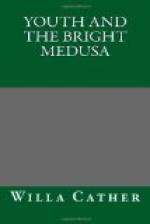To this gallant speech Cressida made no answer. She stood with her hand on the rail and her head bent forward, as if she had lost herself in thought. The ends of her scarf, lifted by the breeze, fluttered upward, almost transparent in the argent light. Presently she turned away,—as if she had been alone and were leaving only the night sea behind her,—and walked slowly forward; a strong, solitary figure on the white deck, the smoke-like scarf twisting and climbing and falling back upon itself in the light over her head. She reached the door of her stateroom and disappeared. Yes, she was a Garnet, but she was also Cressida; and she had done what she had done.
II
My first recollections of Cressida Garnet have to do with the Columbus Public Schools; a little girl with sunny brown hair and eager bright eyes, looking anxiously at the teacher and reciting the names and dates of the Presidents: “James Buchanan, 1857-1861; Abraham Lincoln, 1861-1865”; etc. Her family came from North Carolina, and they had that to feel superior about before they had Cressy. The Garnet “look,” indeed, though based upon a strong family resemblance, was nothing more than the restless, preoccupied expression of an inflamed sense of importance. The father was a Democrat, in the sense that other men were doctors or lawyers. He scratched up some sort of poor living for his family behind office windows inscribed with the words “Real Estate. Insurance. Investments.” But it was his political faith that, in a Republican community, gave him his feeling of eminence and originality. The Garnet children were all in school then, scattered along from the first grade to the ninth. In almost any room of our school building you might chance to enter, you saw the self-conscious little face of one or another of them. They were restrained, uncomfortable children, not frankly boastful, but insinuating, and somehow forever demanding special consideration and holding grudges against teachers and classmates who did not show it them; all but Cressida, who was naturally as sunny and open as a May morning.
It was no wonder that Cressy ran away with young Charley Wilton, who hadn’t a shabby thing about him except his health. He was her first music teacher, the choir-master of the church in which she sang. Charley was very handsome; the “romantic” son of an old, impoverished family. He had refused to go into a good business with his uncles and had gone abroad to study music when that was an extravagant and picturesque thing for an Ohio boy to do. His letters home were handed round among the members of his own family and of other families equally conservative. Indeed, Charley and what his mother called “his music” were the romantic expression of a considerable group of people; young cousins and old aunts and quiet-dwelling neighbours, allied by the amity of several generations. Nobody was properly married in our part of Columbus unless Charley Wilton, and no other, played the wedding march. The old ladies of the First Church used to say that he “hovered over the keys like a spirit.” At nineteen Cressida was beautiful enough to turn a much harder head than the pale, ethereal one Charley Wilton bent above the organ.




